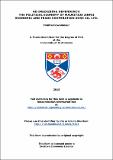Files in this item
Re-inscribing dependency : the political economy of Mauritius JinFei Economic and Trade Cooperation Zone Co. Ltd.
Item metadata
| dc.contributor.advisor | Taylor, Ian | |
| dc.contributor.author | Cowaloosur, Honita | |
| dc.coverage.spatial | xi, 318 | en_US |
| dc.date.accessioned | 2015-04-07T14:32:45Z | |
| dc.date.available | 2015-04-07T14:32:45Z | |
| dc.date.issued | 2015 | |
| dc.identifier | uk.bl.ethos.644846 | |
| dc.identifier.uri | https://hdl.handle.net/10023/6444 | |
| dc.description.abstract | This thesis investigates the capacity of the newly introduced Chinese Special Economic Zones in Africa (CSEZAs) to deliver ‘cooperation’ and ‘mutual development’ to China and Africa. Referring to existing scholarship on other forms of liberal spatial economics, it addresses the conceptual, methodological and theoretical void in which the subject of CSEZAs evolves in academia. As extensive global interactive processes are identified in the schema of the CSEZA, this thesis advocates Andre Gunder Frank’s Dependency Theory as the appropriate prism through which to explicate the new zone format. Empirical data about the seven CSEZAs outline the problematic and development-conducive aspects of the zone model. It is argued here that the failure to customise the SEZ model to the African context is what corrodes the developmental prospects of the CSEZAs. The Mauritius JinFei Economic and Trade Cooperation Zone is taken as an example of a problematic CSEZA. A detailed analysis of the Mauritian case allows a visualisation of the respective role of China and the African state in the CSEZA context. As the exploitative and non-developmental nature of the CSEZA model (in its current form), is established, this thesis concludes that the CSEZA gives a new interpretation to the traditional practice of dependency. This new version, nonetheless, exacerbates the dialectic development-underdevelopment processes integral to the global capitalist economy. | en_US |
| dc.language.iso | en | en_US |
| dc.publisher | University of St Andrews | |
| dc.rights | Creative Commons Attribution-NonCommercial-NoDerivatives 4.0 International | |
| dc.rights.uri | http://creativecommons.org/licenses/by-nc-nd/4.0/ | |
| dc.subject | Chinese special economic zones in Africa | en_US |
| dc.subject | Economic and trade cooperation zones | en_US |
| dc.subject | Dependency theory | en_US |
| dc.subject | Andre Gunder Frank | en_US |
| dc.subject | JinFei | en_US |
| dc.subject | Mauritius | en_US |
| dc.subject | Shanxi | en_US |
| dc.subject | China | en_US |
| dc.subject | Development | en_US |
| dc.subject | Underdevelopment | en_US |
| dc.subject | State owned enterprises | en_US |
| dc.subject | Special purpose vehicles | en_US |
| dc.subject.lcc | HF1418.3M2C7 | en_US |
| dc.subject.lcsh | Mauritius Jinfei Economic and Trade Cooperation Zone Co. Ltd. | en_US |
| dc.subject.lcsh | Free ports and zones--Mauritius | en_US |
| dc.subject.lcsh | China--Foreign economic relations--Mauritius | en_US |
| dc.subject.lcsh | Mauritius--Foreign economic relations-China | en_US |
| dc.subject.lcsh | China--Economic policy--21st century | en_US |
| dc.subject.lcsh | Investment, Foreign--Mauritius | en_US |
| dc.subject.lcsh | Economic development--Mauritius | en_US |
| dc.subject.lcsh | Economic development--China | en_US |
| dc.title | Re-inscribing dependency : the political economy of Mauritius JinFei Economic and Trade Cooperation Zone Co. Ltd. | en_US |
| dc.type | Thesis | en_US |
| dc.type.qualificationlevel | Doctoral | en_US |
| dc.type.qualificationname | PhD Doctor of Philosophy | en_US |
| dc.publisher.institution | The University of St Andrews | en_US |
This item appears in the following Collection(s)
Except where otherwise noted within the work, this item's licence for re-use is described as Creative Commons Attribution-NonCommercial-NoDerivatives 4.0 International
Items in the St Andrews Research Repository are protected by copyright, with all rights reserved, unless otherwise indicated.


